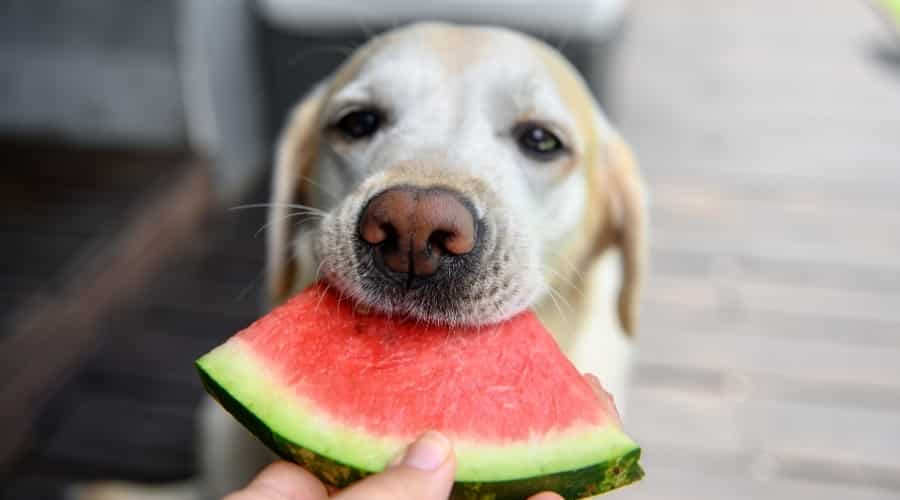It is relatively common for pet parents to share their food with their furry friends. Most dog owners know that anytime they pull out a sandwich, snack, or another food item, they are likely to have a pair of large, endearing canine eyes trying to convince them to share just a bite. Many pet parents have wondered what fruits dogs can eat. This may come about because their pet has developed a liking for a specific fruit or if their pet accidentally got a hold of something. It is normal to wonder if the fruit is safe for dogs.
The good news is plenty of fruits are okay for dogs to eat in moderation. Not every fruit is safe for canines, nor should fruit make up a large part of their diet. For owners worried about their pet’s nutrition, it is better to consult their vet than try to supplement with fruit. However, in some circumstances giving your dog a piece or two of fresh fruit can be a nutritious and delicious treat.
Before you go serving your dog a bowl of fruit at her next meal, it is a good idea to learn a little more about what fruits are safe for dogs to eat. This is important because there is a long list of fruits and other human foods unsafe for canines. As with any kind of treat or dietary supplement, moderation is vital. Even fruits that are pet safe can cause stomach discomfort when eaten in large quantities. Read on to learn more about what fruits dogs can eat.
Choosing Fruits Safe For Dogs
While fruits provide numerous health benefits, not all are healthy or beneficial for canines. Some fruits can cause digestive problems, while others can be toxic and harmful to your pet’s health. Choosing safe fruits for dogs is essential to ensure furry friends’ health and happiness. Additionally, it’s crucial to introduce new fruits gradually, monitor your pet’s reaction, and consult your veterinarian if you notice any adverse reactions.
Fruits Safe For Dogs
Canines are omnivores, so they can eat fruits and vegetables, though they should not make up the majority or a large part of their diet. Treats of any kind should only make up 10% of a dog’s daily calorie intake. The following fruits are safe for dogs to eat in moderate amounts.
Apples

Dogs can safely eat apples. Apples are crunchy and tasty and provide Vitamin A and C. Apples also provide dietary fiber, calcium, antioxidants, and phosphorus. Removing cores and seeds containing cyanide, a substance toxic to canines, is essential. Apples should be fresh, raw, and not overripe. Dogs can eat apple slices or puree.
If you have an apple tree in your yard, cleaning up old, fermented apples is important. These can contain higher levels of ethanol, making your dog sick. Stick to fresh, clean apples for your pup. If you want to give her a real treat, add a little natural peanut butter to the slices, you may just have found your pup’s favorite new treat.
Benefits:
- Freshens the breath and cleans teeth.
- Good source of Vitamins A and C, fiber, calcium, and phosphorus.
- Phytochemicals in apple skin help fight cancer.
- Low-calorie treat.
- Apples reduce inflammation and aid in digestion.
- Good source of hydration.
Apricots
Apricots are okay for dogs as long as the pits have been removed. The pits are a choking hazard and contain cyanide, which is quite dangerous. Apricots are rich in antioxidants like beta-carotene, which can help improve eyesight. It also has benefits in regulating cholesterol and contains fiber and potassium. The dietary fiber in apricots helps with relieving constipation and maintaining bowel health. Vitamins A and C support the immune system, skin, and bone health. Apricots are also very helpful in combating the effects of aging on a canine’s body.
Remove leaves, pits, and stems and cut them into bite-sized pieces. Dried fruit is okay if it does not contain added sugar or artificial sweeteners.
Benefits:
- Relieves constipation.
- Maintain bowel movements.
- Antioxidants boost the immune system and skin health.
- Potassium can help lower cholesterol.
Bananas

Bananas are safe as an occasional treat, and dogs enjoy the texture. These have a lot of sugar, so they should not be fed in large quantities or very often. Bananas can also be harmful to your pup if prepared with toxic seasonings like garlic or if they have existing health issues like diabetes.
Bananas contain potassium, fiber, biotin, and Vitamin B6 levels. Dogs should not be fed the banana peel, which is hard to digest and may pose a choking hazard. These are best served raw, peeled, and sliced.
Benefits:
- Potassium, Vitamin C, B6, magnesium, fiber, and manganese.
- Low sodium and low cholesterol.
- Helpful to settle an upset stomach.
- Provide a boost of energy.
- Help maintain healthy blood pressure.
- Improve brain function.
Blackberries

Blackberries are suitable for canines to eat in appropriate servings. They only need a few berries at a time. These berries provide antioxidants, fiber, Vitamins A, C, K, and E, Omega-3’s, tannin, manganese, and folate. The omega-3 fatty acid in blackberries helps keep their coat glossy and also helps reduce inflammation. Antioxidants are beneficial to improve brain function and work as an anti-inflammatory. Depending on your pup’s size, two or three fresh berries are a perfect serving.
Benefits:
- Promote brain, heart, and coat health.
- Supports muscle development.
- Reduces inflammation.
- Fiber aids in digestion.
- Low in calories.
Blueberries

Blueberries are loaded with antioxidants, anti-inflammatory, and vitamins. They are also very low in calories. Dogs enjoy the taste and texture, and these can be a healthy snack, though it is crucial when feeding smaller breeds that owners be aware these can be a choking hazard.
Dogs should only eat fresh or frozen berries. Owners should mash them up for smaller pups and let them thaw slightly to reduce the chance of choking. Frozen blueberries are a common dog treat in our home.
Benefits
- Low calorie.
- Vitamin C and K and phytochemicals.
- Support brain health.
- Supports heart function.
Butternut Squash

Though we don’t often think of it as fruity, butternut squash is technically a fruit. This winter squash grows on a vine and is a popular food for humans. It is also high in Vitamins A and C. Feeding a dog butternut squash has a beneficial effect on growth, development of strong muscles, and eye health, and it helps prevent skin problems and hair loss.
Butternut squash can be fed raw, but it is better to be enjoyed in its cooked form. Owners can bake, dehydrate, or cook, mash it up, and then add it to their dog’s food. Avoid feeding them the skin as it is tough to chew and digest and may be a choking hazard.
Benefits:
- Boost immune system health.
- Loaded with fiber which aids in digestion and makes tummies feel full.
- Low in carbohydrates and calories.
- It can help with diarrhea.
- Beneficial for eye and muscle health
Cantaloupe

Cantaloupe is a terrific source of dietary fiber, though it has higher sugar. As with other fruits like honeydew, cantaloupe should only be fed in moderation. It is also loaded with water, making it a great way to add hydration to your pup’s diet.
Avoid the seeds as they are difficult to digest and cause stomach upset. The rind is also a no-go, as it is too hard and fibrous for canines to digest. The rind is so tough it can cause obstructions in the food pipe and intestines.
Benefits:
- It contains niacin which can reduce cholesterol.
- Anti-inflammatory effects.
- Vitamin B6 and Vitamin C.
- Fiber aids digestion.
Coconut

Though not as common as some other fruits on this list, coconut has several health benefits. Coconut can be served cut into bite-sized pieces, raw, or cooked into dog treats. It should only be fed in small amounts, as it contains triglycerides that may cause large amounts of bloating and stomach pain. This also helps reduce inflammation. High levels of antioxidants boost skin, eye, and immune system health.
Always remove the shell and cut the meat into small pieces.
Benefits:
- It can fight off fungi and bacteria.
- Aids with digestion.
- Helps with stinky breath.
- It keeps the coat shiny and the skin healthy.
- Immune system support.
Cranberry

Cranberries are known to help with urinary tract health and are suitable for dogs to eat. These tiny, tart berries are high in fiber and antioxidants and a good source of Vitamins A, E, K, B1, B2, and copper. Cranberries help with the immune system and digestive health.
Dried and fresh are okay as long as they have no added sugar or artificial sweeteners like xylitol. Even juice with no added sugar is okay.
Benefits:
- Supports bladder and urinary tract health.
- Antioxidant-rich.
- Helps protect teeth.
- Overall health boost.
Kiwi

Kiwi is safe for pups if the skin and seeds are removed. As with most other fruits, add a small amount of benefit. They should not be fed to canines regularly. Kiwi does have dietary fiber, vitamins and minerals, and antioxidants. These are all beneficial. However, a dog must eat huge amounts for significant health benefits.
Remember that these can be a choking hazard if eaten whole, and the skin can cause constipation.
Benefits:
- Fiber can regulate the digestive system.
- Antioxidants include beta-carotene, folate, and lutein.
- Vitamins and minerals that support the skin and circulatory systems.
Mango

Mangoes are a great source of Vitamins A and C and fiber. They also contain antioxidants that help promote a healthy immune system and reduce inflammation. Mangoes have higher sugar and calories, and too much can cause digestive problems. It should not be eaten in large amounts, as it can cause stomach distress due to triglycerides.
The skin is too tough to digest, and the pit is a choking hazard. Make sure to remove both before feeding your pet. Mangoes are a great way to get more moisture into your dog’s diet as an occasional treat. They can be served fresh or frozen.
Benefits:
- Fat-free.
- Dogs like the taste.
- Low calorie.
- High in Vitamin C.
Nectarines
Nectarines are okay as long as the pits are entirely removed. Pits contain cyanide and are a choking and internal obstruction hazard. Never give a dog the pits. Nectarines have several beneficial qualities. They are packed with moisture, dietary fibers, phytonutrients, antioxidants, vitamins, and minerals.
Only serve fresh fruit, and never more than a few slices.
Benefits:
- High in Vitamin C.
- Low calorie.
- Boost hydration.
Oranges

They help reduce inflammation, promote a healthy immune system, and improve digestion. Like any fruit, too much orange can cause digestive problems, and the acidity can irritate your pet’s stomach.
Always remove the peel and seeds, and only feed in small amounts. Be careful with acidic fruits, as they sometimes cause diarrhea and vomiting. Discuss with your vet before adding clementines or oranges to your pet’s diet. Stick with fresh, peeled fruit, and stay away from the juice.
Benefits:
- Loaded with fibers.
- High in potassium.
- Reduce inflammation.
Papaya

It contains minerals and vitamins that promote full-body health. Nutrients, including potassium, calcium, and folate, support bones and blood. Fiber is helpful in digestion and in avoiding constipation. Vitamins A, C, E, and K support the immune system, skin, and coat. Lower in sugar than some fruits and contains digestive enzymes to help break down other foods.
Try to remove the seeds as they contain cyanide. The skin is tough and should also be removed.
Benefits:
- Boost the immune system and heart health.
- Low sugar and low calorie.
- It boosts digestion and prevents constipation.
Peaches

Peaches are safe but, like other stone fruits, must have the pits removed. They are also good sources of vitamins, minerals, antioxidants, and fibers.
Always wash before serving and remove pits. Some pups may not like the skin. Fresh or frozen fruit is safe. Stay away from canned fruits soaked in heavy syrup.
Benefits:
- Fights infections.
- High in fiber.
- Low calorie.
Pears

Pears are a very healthy treat for canines. When fed correctly, pear is an appropriate and healthy option to treat your dog. They are a healthy source of fiber, copper, and Vitamins A, C, and K. They contain probiotics, potassium, calcium, and magnesium.
Always feed fresh fruit and remove seeds, skin, leaves, and stems. Only feed these very occasionally, as too much can cause stomach distress.
Benefits:
- Supports muscle and nerve function.
- Dietary fiber for digestion.
- Boosts immune system health.
Pineapple

Pineapple is safe but only in small amounts. Fresh fruit is best. Pineapple is full of Vitamin C and minerals like iron, potassium, magnesium, copper, phosphorus, calcium, and zinc. The juicy fruit is nutrient dense but also very sweet. Notably, it contains bromelain, a natural histamine that is anti-inflammatory.
Remove all peels and extra fibrous core. Feed small bites by hand. They can be fresh or frozen. Pureed pineapple can also be added to your pup’s diet for extra moisture, though not every day.
Benefits:
- Nutrient-dense properties.
- It can support digestion.
- Antimicrobial effects on the skin.
Pumpkin

Pumpkin is a common ingredient in many high-quality dog foods. Like butternut squash, it is not often thought of as a fruit, but it is. Raw pumpkins should be avoided, but cooked fruit without the skin is safe. Stay away from any added ingredients or seasoning. Plain, cooked pumpkin is best. Pumpkin flesh is a good source of fiber. It also contains Vitamins A, C, E, and B6, lycopene, niacin, thiamine, folate, calcium, and potassium. Pumpkin seeds are not dangerous to feed to canines if cleaned and roasted with no salt or flavorings.
Mashed or pureed pumpkin is an excellent way to help pups with diarrhea and reduce anal gland problems. Pumpkin also can help with constipation and hairball control. Dogs can safely add a small amount of pumpkin to their diet daily. It is also beneficial for weight loss as it helps pets feel full for longer.
Benefits:
- Helps with digestion.
- Diarrhea aid.
- Bellies feel full longer.
- Daily use.
- Low in sugar and high in nutrients.
Raspberry
Raspberries are safe for canines and can be a tasty snack. They are safe to be fed as they are. Simply wash them to ensure no chemicals or bugs are on them. These juicy berries contain Vitamins A, B, C, and E and are high in minerals. They also have beneficial antioxidants, believed to help with inflammation, allergies, and arthritis, and even help fight cancer.
These berries are a good choice because they are very low in sugar and calories. Raspberries contain high levels of dietary fiber, Vitamin C, manganese, and other nutrients. It contains trace amounts of minerals like manganese, potassium, iron, and copper that support the skeletal system, cell function, muscles, and nervous system.
Benefits:
- It can help with both diarrhea and constipation.
- Fiber helps canines lose weight.
- Low in sugar.
- B-complex Vitamins for coat health.
Strawberry

Strawberries are a great source of fiber, Vitamin C, and antioxidants. They help reduce inflammation, promote a healthy body system, and improve cognitive function. Strawberries are high in vitamins, including B1, B6, and Vitamin K. Additionally, strawberries are low in calories and sugar, making them an excellent option for pups struggling with weight management.
Fresh or frozen berries are safe as long as the leaves and stalks are removed. Avoid strawberry syrup, jelly, and jam, as these often use lots of added sugar, artificial sweeteners, and other ingredients.
Benefits:
- Omega three fatty acids support skin and cold health.
- Aids indigestion.
- Boosts immune system.
- Fresh fruit works to slow down the aging process.
- Strawberries help whiten teeth.
Watermelon

Watermelon is safe for dogs as long as the seeds and rinds are removed. Many pups love this moisture-rich, sweet melon. Watermelon is extremely low in calories and very high in moisture, 92% water, so it adds plenty of moisture to your pup’s diet without a lot of sugar. Watermelon is full of nutrients, including potassium and Vitamins A, B6, and C.
Juicy watermelon can be fed to pets fresh or frozen, as well as in a puree. Some pups even like it blended in with unsweetened yogurt.
Benefits:
- Low calorie.
- High in moisture.
- Antioxidants boost overall health and function.
Final Thoughts
Feeding your dog fruit as a treat can be an excellent way to bond with your furry friend and promote positive behavior. However, ensuring that the fruit you feed your dog is safe and low in sugar and calories is essential. You can also use fruits as a training tool to reward good behavior and encourage obedience.
Incorporating fruit into your pup’s diet is an excellent way of promoting overall well-being and keeping your furry friend healthy and happy. However, it’s crucial to choose safe fruits for dogs, prepare them correctly, and feed them in moderation. Consult with your veterinarian if you notice any adverse reactions or concerns about your pet’s diet.
If you want to learn more about fruits safe for dogs, consult your veterinarian or do further research. Remember always to choose fruits that are safe for your furry friend and feed them in moderation.





